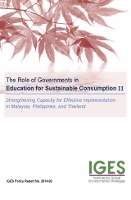Editor:
Focusing on the challenges of the transition to responsible, sustainable lifestyles, this book examines developments over the last decade in relation to: - the creation of awareness of consumer citizenship, civic involvement and environmental stewardship
- research, projects and publications on education for responsible living
- the creation and...




